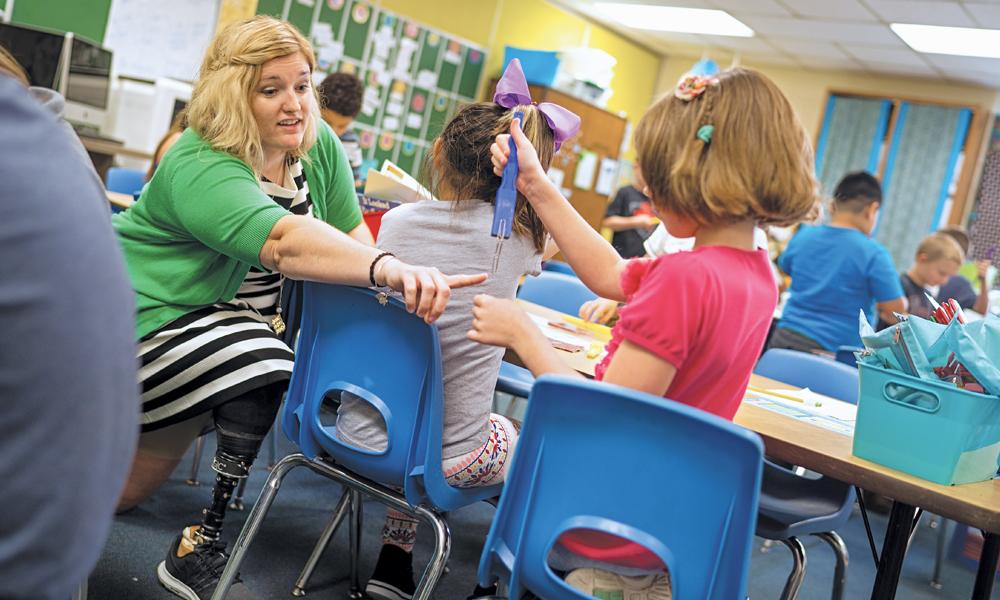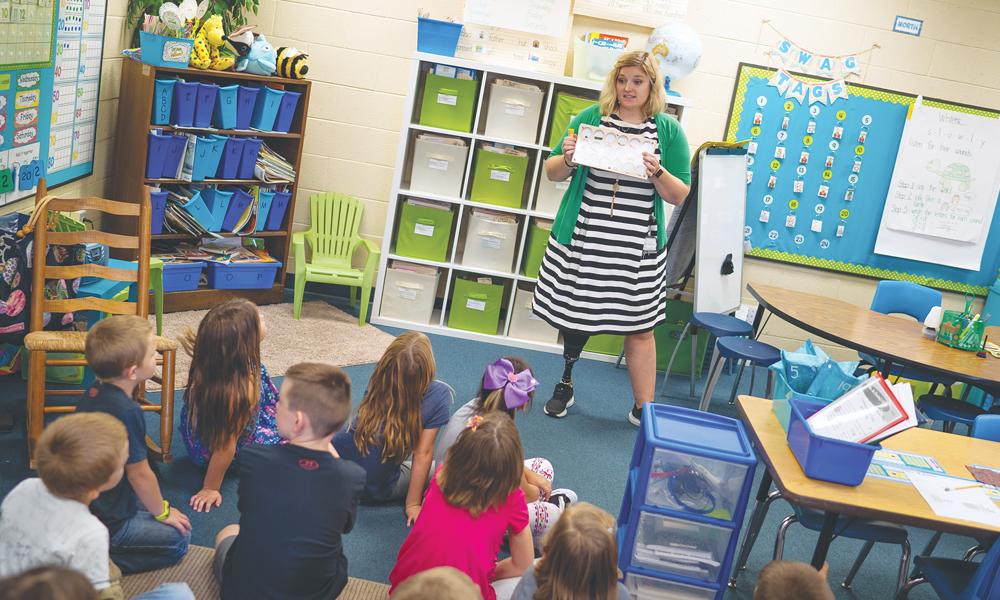Teaching the intangibles
A Teacher of the Year turns a life-changing accident into learning opportunities
Education
SUMMARY: Katie Tusing, a JMU alumna, returns to the classroom after a life-changing accident to teach her second-graders academic skills and life lessons.
from the Winter 2019 issue of Madison
Katie Tusing (’09, ’10M) loves working with young children, especially her second-graders at Ashby-Lee Elementary School in Quicksburg, Virginia, the same school the Mount Jackson native attended.
“Second-graders are a great age to teach because they have a little bit more independence, but they still want to please,” she says. “They are enthusiastic and want to come to school.”
Seven- and 8-year-old students often learn by doing—arranging numbers cards in ascending order, trying out new vocabulary words with the aid of pictures, creating art with many fun supplies. Intangible concepts are trickier by their very definition—they cannot be easily defined.
But Tusing enjoys the challenges of teaching, a career she began after earning a bachelor’s degree in health sciences at JMU. Intending to focus on physical therapy, she recognized that path was not for her. After her physical therapy clinic supervisor encouraged her to consider teaching, saying, “I see you teach patients every day in here,” Tusing returned to JMU to complete a Master of Arts in Teaching degree.
Tusing’s talents as an educator were recognized by her colleagues when she was named the Shenandoah County Public Schools Teacher of the Year for 2017-18. It was the teaching year that almost wasn’t for Tusing.
In January 2017, Tusing’s life turned upside down in an instant.
Hearing a “crunching sound outside,” she and her boyfriend, Dillon Frazier, ran toward a wrecked vehicle in a ditch near their house to offer help. “At that point in time, a car came down the road. I pulled Dillon back and said, ‘Let’s wait for this car to pass.’ That’s when I blacked out and where my memory stops for a bit.”
Police investigators surmised that the first vehicle hit and damaged two utility poles, while the second vehicle hit a guy-wire, causing it to snap. “That wire kind of bull-whipped around and it hit me in the leg and it flipped Dillon,” Tusing says.
As helpers arrived, Tusing called her mother. “I said, ‘Mom, there’s been an accident outside of Dillon’s house. I’m OK, but I’m probably going to lose my leg.’”
Her assessment, based on pain level and seeing the damage to her leg (both the tibia and fibula were broken) proved accurate. After several surgeries and the onset of infection, the decision was made to amputate Tusing’s right leg below the knee.
During 21 days in the hospital and at a rehabilitation center, Tusing had to “figure out how life was going to go on after that,” she recalls. She missed her second-graders and was worried that her teaching career might be over.
Although the injuries kept her from returning to full-time teaching in the second semester, Tusing visited her children “because I felt like it would be good for them and for me. They just had a lot of questions that they needed answered,” she recalls.
That honest exchange cemented Tusing’s decision to return to the classroom. After a slow healing process delayed Tusing’s fitting for a prosthetic leg, it was August 2017 before she was able to return.
With the new school year and a new class of students, the previously active and mobile teacher began adjusting. “For a while I was going through a mental struggle with what this meant for my life, for me as a person,” Tusing says. “I wasn’t sure that this was going to be the place for me. It took a good while to see the positive that could come out of a not-so-positive situation.”
She finally determined that her situation offered learning opportunities for her students.
“I felt in my heart that there are a lot of kids here in this school who probably haven’t had a lot of exposure or experience with people who have an obvious physical disability. I use my situation as a gateway to help my children understand we all struggle with different things, some that we cannot see.
“We talk about how it’s important to be kind to everybody because you don’t know what they’re dealing with. We talk about how I got frustrated when I was learning how to walk again because it wasn’t easy, how I had to keep coming back to it and keep trying and keep working until I got stronger and better. I explain that’s the same thing as something you’re learning that’s hard for you, whether it’s reading, math, whatever. You’ve got to be persistent and you can’t give up.
“Other lessons I’ve learned and try to impart to my students are the value of being adaptable and empathetic. I certainly have real, tangible examples to share with my kids,” she says.
When some of her students were confused by the realistic appearance of her prosthetic foot in comparison to the mechanical look of her lower leg, Tusing invited her prosthetist to the classroom to explain how the artificial limb worked.

Tusing has had to rely on her students to help with her adjustment to the classroom. “That actually turned out well because they felt like they could be of great assistance to someone who needed help, someone who happened to be their teacher.”
From keeping the classroom floor clear of clutter to fetching “Candy,” Tusing’s cane, the children helped. “The son of one of my co-workers carried a chair outside every day for me at recess so I could sit. He took that upon himself.”
Accepting help was one of her life lessons, Tusing says. The Ashby-Lee community has helped in countless ways. “Our school’s reading specialists, who don’t have students assigned as a classroom teacher does, have helped by walking my kids to the bus lines after school. People really want to help.”
The 2018-19 school year has begun with a new class of second-graders and their award-winning teacher who is enduring less physical pain than a year ago.
“I feel like my core principles and values are still the same,” Tusing says. “I still believe we need to be working toward the development of the whole child. It would be a shame to give that up just because I’ve been dealt a kind of crummy hand.”
# # #

